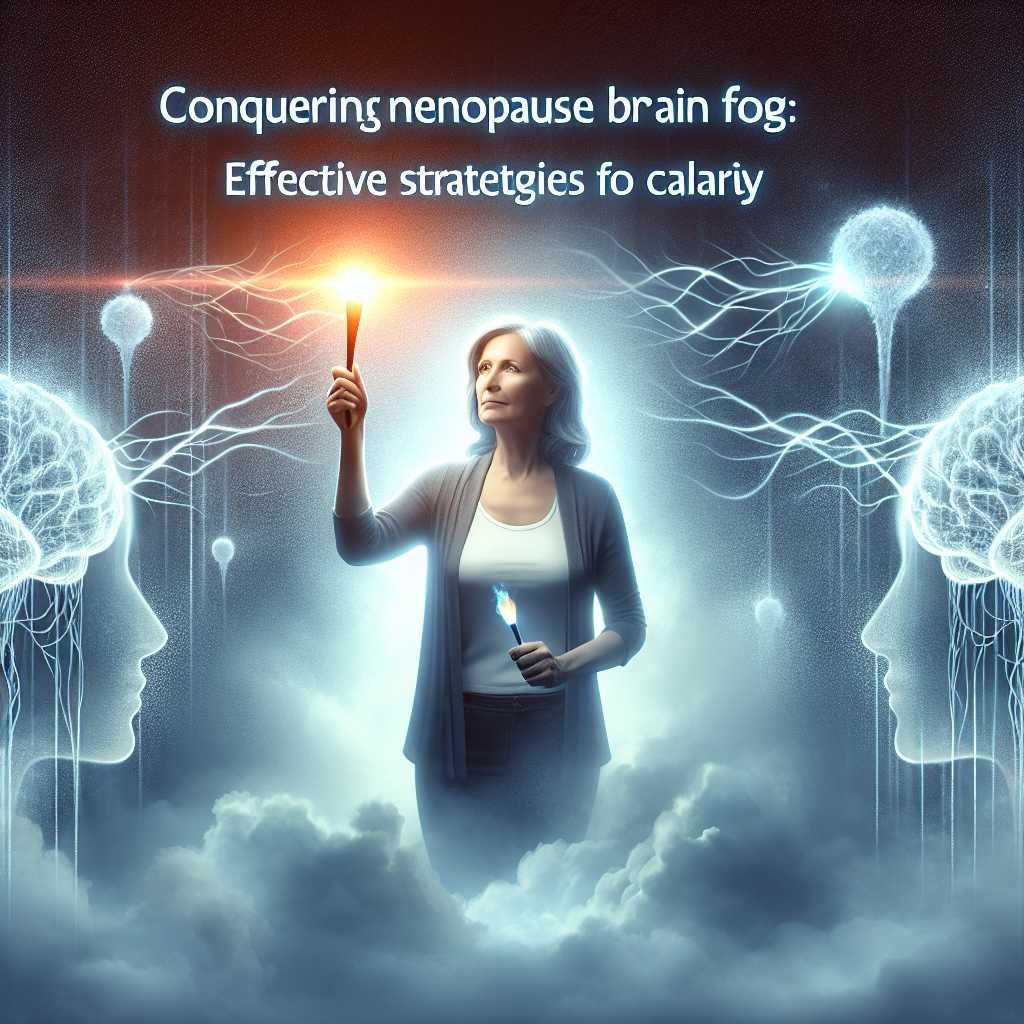Menopause: Understanding Brain Fog and Effective Strategies to Overcome It
Introduction
Menopause marks a pivotal phase in a woman’s life, often accompanied by various challenges that can significantly affect her quality of life. While symptoms such as hot flashes and vaginal dryness are commonly recognized, the cognitive impacts of menopause, particularly brain fog, are frequently underestimated. As a Naturopathic Doctor, I often hear my patients voice concerns about emotional fluctuations, including difficulties with word recall, concentration, and heightened anxiety. These cognitive challenges can be particularly daunting during menopause, as they often coincide with other symptoms like sleep disturbances, fatigue, and weight gain, complicating the coping process.

Understanding Menopause and Its Cognitive Effects
Menopause is characterized by a decline in estrogen production, a hormone that plays a vital role in maintaining brain health. Estrogen is essential for regulating metabolism, enhancing blood flow to the brain, and supporting the growth of neurons, all of which contribute to memory retention and emotional stability. Furthermore, estrogen interacts with neurotransmitters—chemicals that facilitate communication between brain cells—to improve mood and cognitive functions. It also provides protective benefits against brain cell damage, potentially reducing the risk of neurodegenerative diseases like Alzheimer’s.
As estrogen levels decrease during menopause, many women report experiencing heightened anxiety, depression, and memory issues. Recent studies utilizing advanced imaging techniques, such as PET scans, have revealed that estrogen receptors in the brain increase during menopause in an attempt to compensate for the drop in estrogen levels. Additionally, structural changes in the brain, including alterations in hippocampal volume and white matter integrity, have been linked to cognitive decline and mental health challenges, such as brain fog and mood swings. Understanding these changes is crucial for developing effective strategies to manage cognitive difficulties during menopause.
Strategies to Combat Brain Fog
In this section, we will explore three evidence-based lifestyle strategies designed to help women navigate menopause while enhancing mood and cognitive health. Let’s delve into these Power Habits and discover practical tips for integrating them into your daily life.
Power Habit #1: Engage in Physical Activity
Regular physical activity is vital for maintaining brain health, as it is associated with lower rates of cognitive decline and improved mood. For postmenopausal women, exercise is particularly beneficial. Research indicates that the cognitive benefits of physical activity are more pronounced in women than in men. Exercise increases blood flow to the brain, stimulates the growth of new neurons, and releases endorphins, which can help alleviate mood swings and anxiety by promoting neuroplasticity.
Combining physical exercise with cognitive training can yield even greater benefits against age-related cognitive decline. This approach, known as physical-cognitive training, includes activities such as dance, martial arts, or interactive video games, which enhance both physical fitness and cognitive functions like memory and attention.
Here are three practical tips to help you establish a consistent exercise routine and achieve the recommended goal of 30 minutes of activity five times a week:
- Start Small: Begin with short sessions of 10-15 minutes and gradually increase the duration as you become more comfortable. Set realistic goals, such as starting with three days a week and working up to five.
- Create a Routine: Schedule workouts at the same time each day and set reminders to stay on track. This consistency fosters accountability and helps form the habit.
- Find a Workout Buddy: Exercising with a friend or joining a class can make workouts more enjoyable, and the social support can help you stay committed.
Power Habit #2: Nourish Your Brain
A well-balanced diet is crucial for maintaining brain health and managing the emotional and cognitive challenges associated with menopause. A diet rich in fruits, vegetables, whole grains, lean proteins, and healthy fats provides essential nutrients that support brain function and overall mental well-being. This type of diet also benefits bone and heart health, which are particularly important during menopause.
To enhance your brain health, consider focusing on the following three key nutrients:
- Antioxidants: Foods such as berries, dark chocolate, leafy greens, and beans are rich in antioxidants that support brain health. A study found that consuming the equivalent of one cup of blueberries daily significantly improved memory and decision-making abilities. Additionally, a multivitamin containing Vitamins A, C, and E can further enhance brain health during menopause.
- Omega-3 Fatty Acids: Found in fish, nuts, and seeds, omega-3 fatty acids are vital for brain health and mood regulation. They help reduce inflammation and boost serotonin levels, which can prevent depression. While dietary sources are important, supplementation of 2-4 g/day may be necessary for optimal benefits.
- B Vitamins: Vitamins B6, B12, and folate are essential for mood regulation, cognitive function, and energy production. These vitamins can help alleviate menopause symptoms like anxiety and brain fog. Natural sources include lean meats, fish, leafy greens, legumes, and dairy.
Additionally, staying hydrated is crucial for brain and emotional health. Aim to drink at least eight glasses of water daily, and consider herbal teas or infused water for variety. By implementing these dietary tips, you can enhance your brain health and overall well-being during menopause.
Power Habit #3: Prioritize Joy
Menopause can be a transformative time, offering a unique opportunity to reconnect with yourself and prioritize self-care. Many women find themselves in caregiving roles, often neglecting their own needs. This stage of life can be an ideal time to shift focus inward and embrace practices that nurture your mind and spirit.
Here are three practical strategies to cultivate joy and alleviate brain fog during menopause:
- Practice Mindfulness: Incorporate meditation and yoga into your daily routine to reduce anxiety and promote relaxation. These practices help regulate stress hormones and enhance mental well-being.
- Prioritize Sleep: Establish a regular sleep routine, create a restful environment, and avoid stimulants before bedtime to improve sleep quality. Quality sleep is essential for brain health and emotional stability.
- Engage in Joyful Activities: Rediscover or immerse yourself in activities that bring you joy, such as dancing, painting, or gardening. These pursuits can significantly boost your mood and mental health.
By making joy a priority, you not only enhance your overall well-being but also set a positive example of self-love and care for those around you. Embrace this time as an opportunity to nourish your soul and celebrate the vibrant, resilient person you are.

Conclusion
While navigating menopause can be challenging, it also presents a unique opportunity to reconnect with yourself and prioritize your well-being. By embracing the power habits of physical activity, proper nutrition, and prioritizing joy, you can significantly enhance your mental and emotional health during this transformative period.
Disclaimer: This Wellness Hub does not intend to provide diagnosis or treatment advice.

